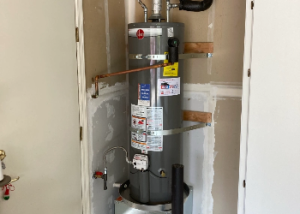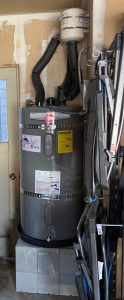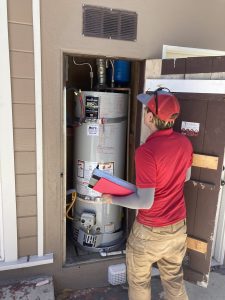
When it comes to selecting a tank water heater, one of the most critical decisions you’ll face is whether to opt for a gas, electric, or hybrid model. All three types of water heaters are widely used and have their own sets of advantages and disadvantages. In this comprehensive guide, we’ll explore how gas, electric, and hybrid water heaters work, delve into the pros and cons of each, and help you decide which option is the best fit for your home’s needs.
Gas Water Heaters
How Gas Water Heaters Work
Gas water heaters are a popular choice for many homeowners due to their efficiency and reliability. Here’s a detailed look at how they operate:
- Cold Water Inlet: When you turn on a hot water tap in your home, cold water enters the tank through a pipe called a dip tube. This tube directs the cold water to the bottom of the tank, where it can be heated.
- Gas Burner: At the base of the tank is a gas burner, which ignites to heat the water. The burner is fueled by natural gas or propane, depending on the model. The burner is controlled by a thermostat, which monitors the water temperature inside the tank. When the water temperature drops below a set point, the thermostat sends a signal to ignite the burner, which then heats the water.
- Heat Exchanger and Flue: The heat generated by the gas burner is transferred to the water through a heat exchanger. A flue runs up the center of the tank, allowing exhaust gases produced by the burning gas to escape safely out of the home. The flue also serves as a secondary heat exchanger, capturing additional heat from the exhaust gases and transferring it to the water.
- Hot Water Outlet: As the water heats up, it rises to the top of the tank. When you turn on a hot water tap, the heated water exits the tank through the hot water outlet and is delivered to your faucets or appliances.
- Temperature and Pressure Relief Valve: To ensure safety, gas water heaters are equipped with a temperature and pressure relief (T&P) valve. If the water temperature or pressure inside the tank becomes too high, the valve opens to release water and reduce the pressure, preventing the tank from exploding.
Pros of Gas Water Heaters
- Faster Heating: One of the biggest advantages of gas water heaters is their ability to heat water quickly. This is particularly beneficial during peak usage times, such as in the morning when multiple household members may need hot water simultaneously.
- Lower Operating Costs: In many regions, natural gas is more affordable than electricity, making gas water heaters less expensive to operate over time. The cost savings can be significant, especially in larger households with higher hot water demands.
- Operational During Power Outages: Unlike electric water heaters, gas water heaters do not rely on electricity to operate. Because of this, some gas water heaters still produce hot water during a power outage. If this is an important feature to you, talk with your plumber about options.
- Higher Recovery Rate: Gas water heaters typically have a higher recovery rate compared to electric models. This means they can heat more gallons of water per hour, which is crucial for households with high hot water consumption.
Cons of Gas Water Heaters
- Higher Initial Costs: Gas water heaters generally have a higher upfront cost than electric models. The purchase price, along with the cost of installing gas lines and proper venting, can make the initial investment more expensive.
- Ventilation Requirements: Proper ventilation is essential for gas water heaters to expel exhaust gases safely. This can complicate installation, especially in homes without existing venting systems. In some cases, installing a gas water heater may require additional modifications to the home’s structure.
- Safety Concerns: While gas water heaters are generally safe when properly installed and maintained, there is a potential risk of gas leaks and carbon monoxide poisoning. It’s crucial to have carbon monoxide detectors in place and to regularly inspect and maintain the water heater to ensure it’s functioning safely.
- Environmental Impact: Burning natural gas produces carbon dioxide and other greenhouse gases, contributing to environmental concerns. Although natural gas is cleaner than some other fossil fuels, it still has a carbon footprint that may be a consideration for environmentally conscious homeowners.
- Regulatory Restrictions: Various state, city, and county laws may restrict the installation of gas water heaters in new construction homes.

Electric Water Heaters
How Electric Water Heaters Work
Electric water heaters are another popular option, especially in areas where electricity is readily available and relatively inexpensive. Here’s how they function:
- Cold Water Inlet: As with gas water heaters, cold water enters the electric water heater tank through a dip tube. The cold water is directed to the bottom of the tank, where it can be heated.
- Heating Elements: Electric water heaters are equipped with one or two electric heating elements, usually located near the bottom and middle of the tank. These elements are responsible for heating the water. The elements are controlled by thermostats, which activate the elements when the water temperature drops below the desired set point.
- Direct Heat Transfer: The heating elements directly convert electrical energy into heat, which warms the water. As the water heats up, it rises to the top of the tank, ready to be delivered to your taps when needed.
- Hot Water Outlet: When you turn on a hot water tap, the heated water at the top of the tank is drawn out through the hot water outlet and delivered to your faucets, showers, or appliances.
- Temperature and Pressure Relief Valve: Like gas water heaters, electric models are equipped with a T&P valve to release excess pressure.
Pros of Electric Water Heaters
- Lower Initial Cost: Electric water heaters generally have a lower upfront cost compared to gas models. They don’t require gas lines or venting systems, making the installation process simpler and less expensive.
- Safety: Electric water heaters do not carry the same risks as gas models, such as gas leaks or carbon monoxide poisoning. This makes them a safer option, especially in homes where gas safety might be a concern.
- Energy Efficiency: Electric water heaters are typically more energy-efficient than gas models because they don’t lose heat through venting. All the energy consumed goes directly into heating the water, resulting in higher efficiency.
- Quiet Operation: Electric water heaters operate more quietly than gas models because there’s no combustion or venting involved. This can be a significant advantage in homes where noise levels are a concern.
Cons of Electric Water Heaters
- Slower Heating: One of the main drawbacks of electric water heaters is that they generally heat water more slowly than gas models. This can result in longer wait times for hot water and a higher likelihood of running out during periods of high demand.
- Higher Operating Costs: In many regions, electricity is more expensive than natural gas, which can lead to higher ongoing operating costs for electric water heaters. This is especially true in areas where electric rates are high.
- Vulnerability to Power Outages: Electric water heaters rely entirely on electricity to operate, which means they won’t work during a power outage. This can be a significant disadvantage in areas prone to electrical interruptions.
- Lower Recovery Rate: Electric water heaters typically have a lower recovery rate compared to gas models, meaning they may not be as effective at meeting the hot water demands of larger households or during peak usage times.
- Regulatory Restrictions: Various state, city, and county laws may restrict the installation of electric water heaters in new construction homes.

Hybrid Water Heaters
How Hybrid Water Heaters Work
Hybrid water heaters, also known as heat pump water heaters, combine the technology of a traditional electric water heater with a heat pump. This innovative design allows them to be more energy-efficient than conventional electric or gas water heaters. Here’s a closer look at how hybrid water heaters operate:
- Heat Pump Technology: The key feature of a hybrid water heater is the heat pump, which draws heat from the surrounding air and transfers it to the water in the tank. The heat pump sits on top of the water heater and uses a fan to pull in air, which is then passed over evaporator coils containing refrigerant. The refrigerant absorbs the heat from the air, and the resulting warm refrigerant is compressed to increase the temperature even further.
- Heat Transfer to Water: The heated refrigerant is then passed through a heat exchanger, which transfers the heat to the water in the tank. This process is highly efficient because it moves heat rather than generating it directly, as in traditional electric or gas water heaters.
- Electric Heating Elements: Hybrid water heaters also have traditional electric heating elements as a backup for times when the heat pump cannot extract enough heat from the air, such as during very cold weather or periods of high hot water demand. This ensures a continuous supply of hot water, even when the heat pump alone isn’t sufficient.
- Temperature and Pressure Relief Valve: Like gas and electric water heaters, hybrid models are equipped with a T&P valve to release excess pressure.
- Operating Modes: Many hybrid water heaters come with multiple operating modes, allowing homeowners to choose between efficiency and performance based on their needs. These modes typically include “Heat Pump” mode (most efficient), “Hybrid” mode (combination of heat pump and electric elements), “Electric” mode (standard electric water heating), and “Vacation” mode (low energy usage when away).
Pros of Hybrid Water Heaters
- Energy Efficiency: Hybrid water heaters are among the most energy-efficient options available. They can be up to three times more efficient than traditional electric water heaters. This efficiency is due to the heat pump’s ability to transfer heat from the air rather than generating it directly. While operating costs are typically lower than electric units, it is still more expensive than gas water heaters. However, if you are looking for a balance between an environmentally friendly water heater that is still reliable, a hybrid water heater could be a good option for you.
- Environmental Impact: Hybrid water heaters have a smaller carbon footprint compared to gas models because they don’t burn fossil fuels. Additionally, their high efficiency means they use less electricity, which can further reduce environmental impact, especially if the electricity comes from renewable sources.
- Smart Features and Flexibility: Many hybrid water heaters come with smart controls and multiple operating modes, allowing homeowners to optimize performance based on their needs. For example, the “Vacation” mode reduces energy use when the water heater isn’t needed, while the “Hybrid” mode balances efficiency with performance.
Cons of Hybrid Water Heaters
- Higher Initial Cost: Hybrid water heaters are more expensive to purchase and install than traditional electric or gas models. The upfront cost can be a barrier for some homeowners. Additionally, while hybrid water heaters are very energy efficient, homeowners should be aware that energy savings do not always translate into lower operating costs. Despite their efficiency, the operating costs of hybrid water heaters can still be higher compared to gas water heaters.
- Space Requirements: Because hybrid water heaters rely on drawing in ambient air, they require more space for proper airflow. They need to be installed in areas with adequate room and may not be suitable for small or confined spaces. Additionally, they typically have a larger footprint than conventional water heaters.
- Performance in Cold Climates: Hybrid water heaters are less effective in colder climates, where the surrounding air temperature may be too low for the heat pump to extract sufficient heat. In such cases, the unit relies more on its electric heating elements, which reduces its overall efficiency and increases operating costs by a noticeable margin.
- Noise Level: Hybrid water heaters produce noise during operation, primarily from the heat pump fan and compressor. Homeowners need to consider whether this noise is acceptable for their living environment.
- Maintenance and Complexity: Hybrid water heaters are more complex than traditional water heaters, which can make them more challenging to maintain. The heat pump and its components may require regular maintenance to ensure optimal performance, adding to the long-term upkeep costs. For example, the air filter on a hybrid water heater must be cleaned once a month.
Choosing the Right Water Heater for Your Home
Selecting the right water heater for your home involves considering several factors, including your household’s hot water needs, energy costs, installation constraints, and long-term plans. Here’s a closer look at some of the key considerations:
- Energy Costs in Your Area: The relative cost of natural gas versus electricity in your region will heavily influence the overall operating costs of your water heater. If natural gas is significantly cheaper, a gas water heater might offer substantial savings over time. Conversely, if electricity is more affordable, an electric or hybrid water heater could be the more cost-effective option. Hybrid water heaters, in particular, are extremely energy-efficient, but that doesn’t necessarily mean there will be savings in operating costs.
- Household Size and Hot Water Demand: The size of your household and your daily hot water usage are critical factors in determining the best water heater. Larger households with higher hot water demands may benefit from the faster heating and higher recovery rate of a gas water heater. Hybrid water heaters are also a good option for larger households, as they can handle high demand more efficiently than traditional electric models. Smaller households or those with lower hot water needs might find an electric water heater sufficient, or a hybrid water heater could be a great choice for balancing efficiency and performance.
- Installation Considerations: If your home doesn’t already have gas lines or a venting system, installing a gas water heater could be more complex and costly. Electric and hybrid water heaters, with their simpler installation requirements, might be the more practical option, especially in homes where space is limited or retrofitting is challenging. However, hybrid water heaters require adequate space and airflow, so they may not be suitable for very tight or confined spaces.
- Environmental Impact: If reducing your carbon footprint is a priority, consider that electric and hybrid water heaters can be powered by renewable energy sources, making them a greener choice. Hybrid water heaters are particularly environmentally friendly due to their high efficiency and reduced electricity usage. However, if your electricity is primarily generated from fossil fuels, the environmental benefits may be less significant compared to gas water heaters, which, while more efficient than traditional electric heaters, do contribute to carbon emissions.
- Long-Term Plans: Consider how long you plan to stay in your current home. A gas water heater might offer savings in the long run, but if you plan to move within a few years, the higher upfront cost may not be worth it. On the other hand, an electric or hybrid water heater’s lower initial cost (for electric) and long-term energy savings (for hybrid) might be more appealing for shorter-term homeowners. Hybrid water heaters, though more expensive upfront, can provide significant savings over time, making them a great investment for long-term homeowners looking to reduce their energy bills.

Conclusion
When it comes to choosing a water heater, understanding the differences between gas, electric, and hybrid models is crucial. Each type has its unique set of advantages and disadvantages, and the best option will depend on factors like your household’s hot water demand, energy costs in your area, installation conditions, and environmental considerations.
Gas water heaters offer fast heating, lower operating costs in many regions, and reliability during power outages. However, they require proper ventilation and have a higher environmental impact. Electric water heaters are safer and quieter, but they generally have higher operating costs and slower heating times. Hybrid water heaters provide exceptional energy efficiency and lower long-term costs, but they come with higher initial costs, require more space, and may be less effective in colder climates.
By carefully considering your specific needs and consulting with a professional, you can make an informed decision that ensures you have a reliable and efficient water heater that meets your household’s demands. Whether you opt for gas, electric, or hybrid, the right water heater can provide comfort, convenience, and cost savings for years to come.
If you’re unsure which water heater is the best fit for your home, or if you’re ready to upgrade your current system, don’t hesitate to reach out. Call Fred at A2Z Water Heaters on his personal phone today to schedule a consultation. With years of experience and a commitment to quality, we can help you choose and install the perfect water heater for your needs. Experience the difference that professional expertise and personalized service can make—contact Fred now at (916) 402-9006!